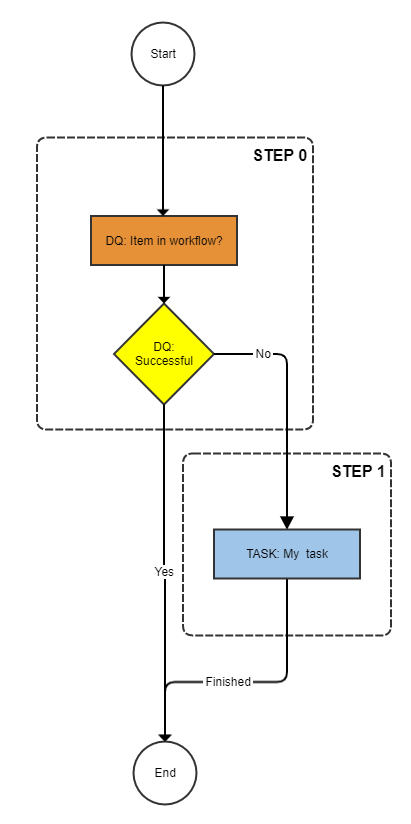Example 1 (1 Task)
The first workflow only puts items into a workflow task called “My first task” For this workflow task we need 2 steps. The first step checks whether the affected item is already in this workflow, if not it will be put into the task. The first step is mandatory and will be very useful in subsequent examples. With this approach you can ensure that the item is not in the same workflow more than one time. This is very important for typical approval workflows.
Diagram for example 1

Explanation of the steps example 1
|
Step |
Description |
|
0 |
Check whether item is already in this workflow. |
|
1 |
Put the item into the task "My first task". |
Product 360 prerequisites for example 1
|
Product 360 entity |
value |
|
Usergroup |
Standardusers |
|
Ui Template |
Item approve UI |
Info
Standarduser is the Identifier of the Usergroup!
StepWorkflow.xml file for example 1
<?xml version="1.0" encoding="UTF-8"?><imp:payload xmlns:imp="http://www.informatica.com/schema/ItemMap" contentType="string"> <workflow> <label>Example Workflow 1</label> <identifier>Workflow_01</identifier> <version>1.0</version> <step> <id>0</id> <entity>Article</entity> <enterStatus>Never</enterStatus> <batchSize>500</batchSize> <executeDq>Always</executeDq> <dqService>ItemsInWorkflowTasks-Process</dqService> <dqFailStep>STEP:1</dqFailStep> </step> <step> <id>1</id> <entity>Article</entity> <workflowStatus>My first task</workflowStatus> <description>My first workflow task</description> <workflowServiceEndpoint>StepWorkflow-Trigger</workflowServiceEndpoint> <enterStatus>Always</enterStatus> <userType>userGroup</userType> <userName>Standardusers</userName> <uiTemplate>Item approve UI</uiTemplate> <executeDq>Never</executeDq> </step> </workflow></imp:payload>Detailed explanation of the steps
Step 0
This steps checks only whether the item is already in this workflow. If not the executed next step is 1. If yes the workflow will end because there is no next step defined.
|
Key |
Value |
Description |
|
id |
0 |
Identifier of the step. |
|
entity |
Article |
Entity container for this workflow. |
|
enterStatus |
Never |
The circumstances when an item should enter a status (task). In this case never! |
|
batchSize |
500 |
Batch size to use with trigger batching. |
|
dqService |
ItemsInWorkflowTasks-Process |
This DQ service is an additional bpel inside the StepWorkflow which checks whether the item is already inside this workflow or not. |
|
dqFailStep |
STEP:1 |
The item will be moved to the step with the identifier 1 if the above dq fails. |
Step 1
This steps checks only whether the item is already in this workflow. If not the executed next step is 1. If yes the workflow will end because there is no next step defined.
|
Key |
Value |
Description |
|
id |
1 |
Identifier of the step. |
|
entity |
Article |
Entity container for this workflow. |
|
workflowStatus |
My first task |
Status name within the Product 360 workflow. ==> Product 360 task name = [Workflow] - [Status] - [Catalog] |
|
description |
My first workflow task |
Description of the status. |
|
workflowServiceEndpoint |
StepWorkflow-Trigger |
This is the service name of the partner link. This name is defined in the process deployment descriptor of the workflow. |
|
enterStatus |
Always |
The circumstances when an item should enter a status (task). In this case always! |
|
userType |
userGroup |
Type of the default assignee of this task. In this case it will be a usergroup. |
|
userName |
Standardusers |
Name/Identifier of the Default assignee of the task. ==> The item will be assigned to the usergroup "Standardusers". |
|
uiTemplate |
Item approve UI |
This is the default UI of the task. |
|
executeDq |
Never |
The circumstances when a DQ should be run. In this case never! |